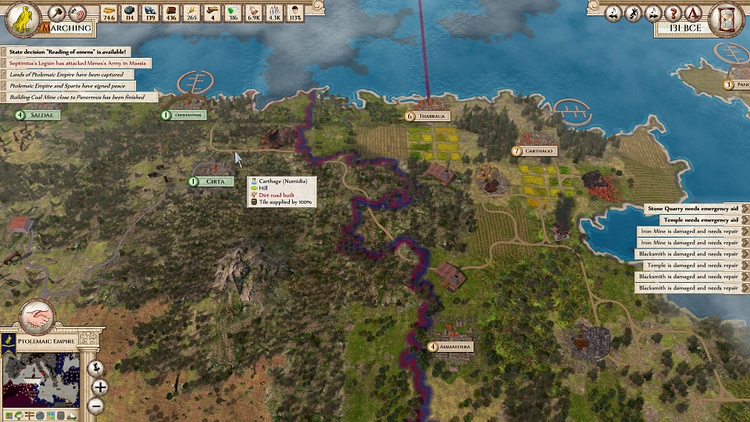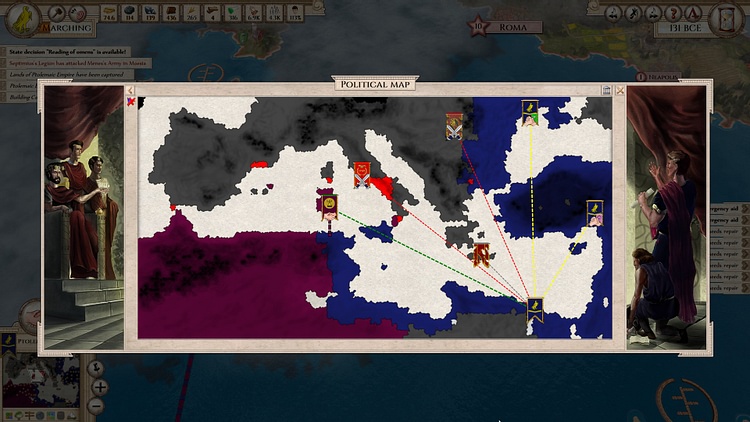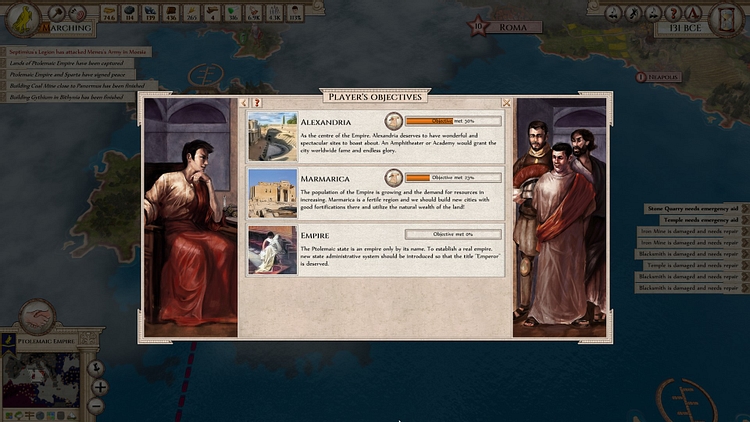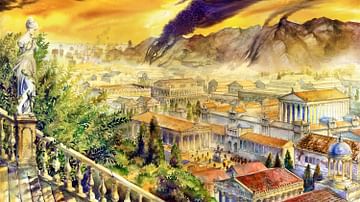| Genre: | Turn-Based Strategy |
| Audience: | Hardcore Strategy Gamers |
| Difficulty: | Hard |
Aggressors: Ancient Rome is a turn-based 4X strategy game in which you control the fate of an ancient Mediterranean state around the time of the Punic Wars. You build cities, raise and control armies, engage in diplomacy, conquer territories, research new technologies and expand your empire.

The game is clearly aimed at experienced strategy games. Even though the gameplay is very similar to the Civilization series, it is more complex and the game mechanics are at times obtuse and difficult to understand. In terms of complexity, the game is somewhere in between the Endless Space series and the Europa Universalis series. It is one of those games where it is worth reading the manual, even for experienced strategists.
Upon starting the game, the player chooses from a large number of states. The big three are Rome, Carthage and Ptolemaic Egypt, but the player can also choose smaller states such as Athens or Sparta, as well as tiny “barbarian” nations from northern Europe. Not all states are equally difficult; Rome, Carthage, and Egypt already have established empires and are technologically advanced (with strong military units) while many smaller nations start with a single city and weak units.

This is an indie game and has to be taken as such. Compared to similar big-budget titles like Civilization or Total War: Rome 2, the game's graphics, music, and general atmosphere are lacking. The game feels like it is from a different era, but that is not necessarily a bad thing. It really does add some charm to the game.
What the game really excels in is —quite surprisingly— its AI. The computer plays well, even on easy difficulty, and manages to outmanoeuvre the player's armies. Just like in history, Rome seems to always get out on top, while the smaller states get eaten up by their bigger neighbours. This way, towards the end of the game, the player is facing a few large empires. The typical “oh I have won anyway” point that you often encounter in Civilization or Total War rarely occurs in this game.
Diplomacy and trade work pretty much as expected from other games. You can make proposals, deals, alliances, and exchange resources. One mechanic that is quite nice is the fact that the AI sometimes offers to become a vassal state of a larger neighbour. The larger state then controls cities and armies of the vassal state. Surprisingly, the AI also sometimes offers to become vassal of the player, which is extremely rare in many other games.

Like in many other games, there are several ways the player can win the game, the most straightforward being military conquest. However, there are also political and economic options for victory available.
The game's 3D graphics look like they were made about ten years ago, and some of the 2D graphics are taken straight from online sources. For example, one of the technology icons is a straight copy of a Hoplite illustration from Wikipedia. The music is also not amazing. Even though many songs attempt to create an ancient ambience, they sound very computer-generated, like a computer game from the 1990s.
The game's controls are also at times counterintuitive. For example, in most games left-click means select and right-click means action. However, the developers of Aggressors decided that right-click would deselect and left-click would be used for both selection and action. Strange! There are many other smaller usability issues like this, but none of them will stop you from enjoying the game.
As I have mentioned before, the game is difficult. It took me more attempts and several evenings to feel that I have come to grips with most of the game's mechanics. And then only a few evenings later I googled how population growth (an important mechanic) works and only by reading the developers' explanation on a forum was I able to get to grips with that, too.
Despite these issues, this indie game is fun to play and I would recommend it… if you are up for a challenge, that is. You can take a deep dive into the ancient world and get hooked on empire-building with this game. Its setting alone will surely appeal to our readers, after all!
Disclaimer: The author received a free game code to review this game. The author has previously professionally worked on the competitor game series Total War.







